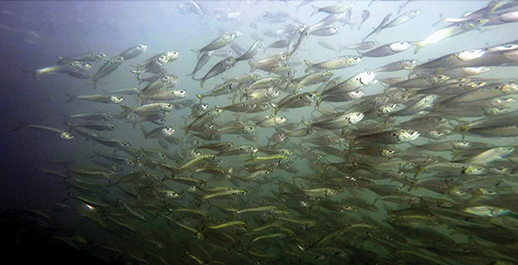Recreational fishing and environmental advocates applauded as the Atlantic States Marine Fisheries Commission agreed Aug. 5 to consider the larger value of menhaden to the ocean ecosystem in developing its management plans.
The step means the commission will start to account for menhaden’s role as food for other fish species, including striped bass, bluefish and weakfish – a goal for decades among recreational fishing groups.
“This is a historic day for fisheries management. Menhaden have been called ‘the most important fish in the sea’ for good reason,” said William C. Baker, president of the Chesapeake Bay Foundation, referring to the title of a 2007 book by menhaden conservation advocate H. Bruce Franklin. The Rutgers University professor and cultural historian called for valuing menhaden for their ecological services, warning then of “ominous signs that we may have pushed our most important fish to the brink of an ecological catastrophe.”
The Atlantic states commission resisted that doomsday warning then, but over the years tightened controls on the menhaden reduction fishery practiced by Omega Protein based at Reedville, Va., on Chesapeake Bay.
Over the past decade, the commission examined several ecosystem models to develop new ecological reference points to ensure the menhaden are numerous enough to feed and rebuild striped bass and bluefish populations.
“This landmark decision represents a new era in fisheries management,” said Whit Fosburgh, president and CEO of the Theodore Roosevelt Conservation Partnership. “We are grateful for the Commission’s support of comprehensive strategies that support the entire Atlantic ecosystem. This decision will spur healthier menhaden and gamefish populations while supporting the recreational fishing economy along the eastern seaboard.”
Omega Protein officials said they will “work with the commission and its staff on further developing the ERP (ecological reference points) model and identifying future harvest levels for the fishery.
“The ERP working group has worked for many years to develop the ecosystem model, and we will continue to support its development as the model’s accuracy and reliability improves over the next few years,” the company said in a statement following the commission’s decision. “It is now the responsibility of the commission to accurately estimate the populations of both menhaden and its predators and then make fair and equitable management decisions based upon the model’s findings.”
Omega and other commercial fishing advocates have long insisted that the impact of the purse seine fishery is overblown by their recreational counterparts.
“The best available science shows that current management is already doing much to ensure that menhaden meets ecological needs,” the company said, citing a recent study by professor Steve Cadrin of the University of Massachusetts Dartmouth that calculated 99.5 percent of menhaden are left in the water after the annual commercial landings. “The latest Commission stock assessment further confirms that menhaden is not overfished, nor is overfishing occurring, with menhaden biomass near record highs.”







